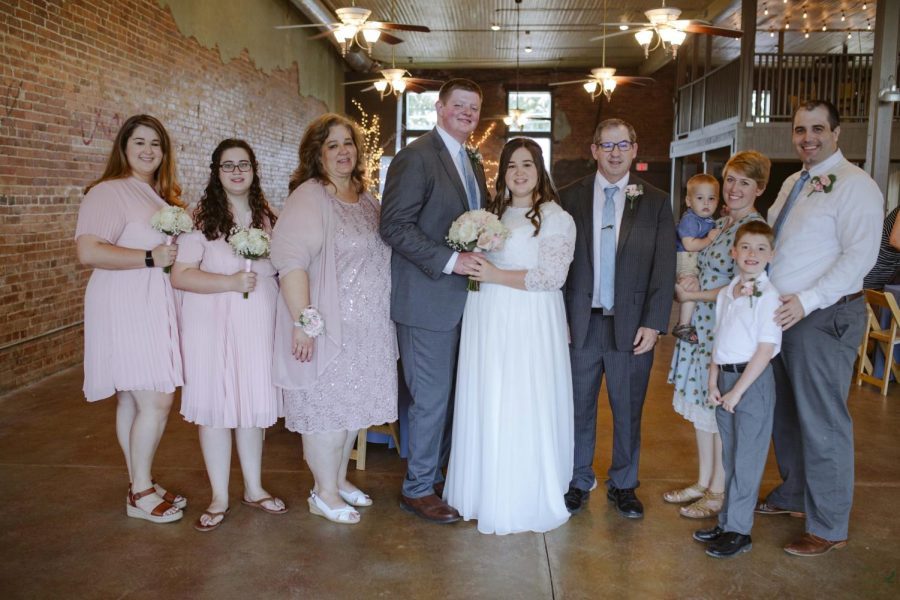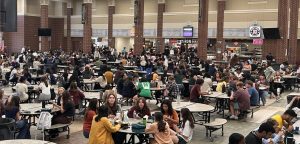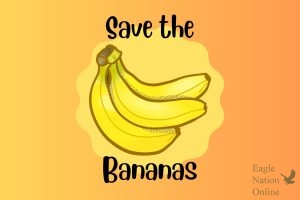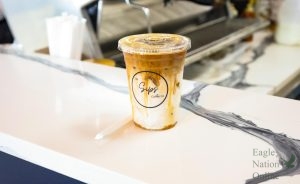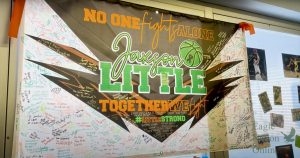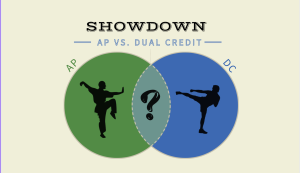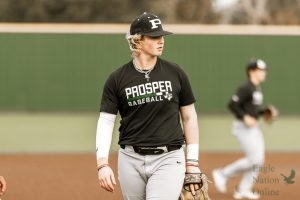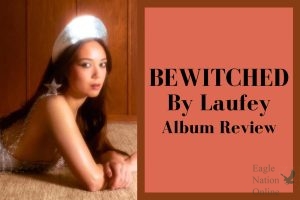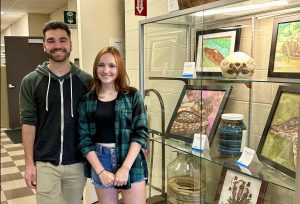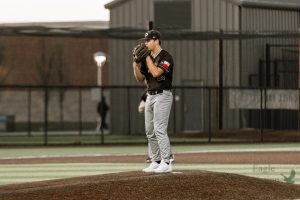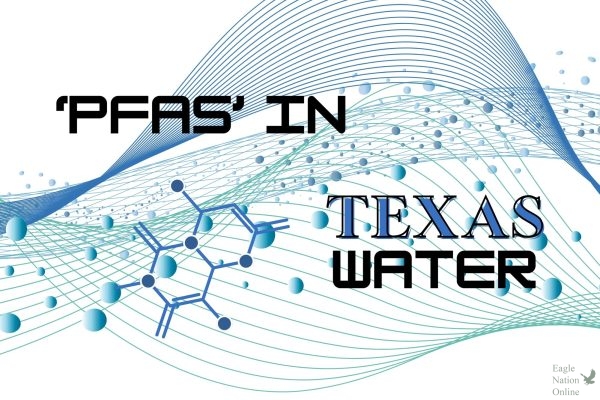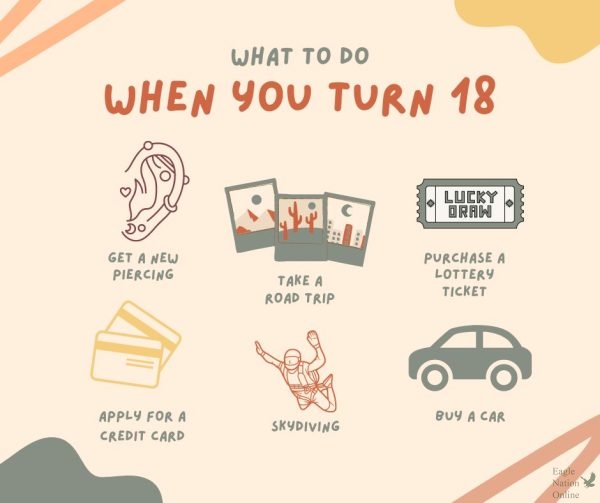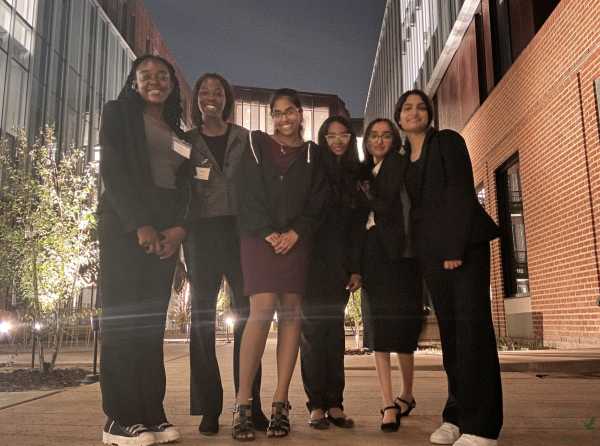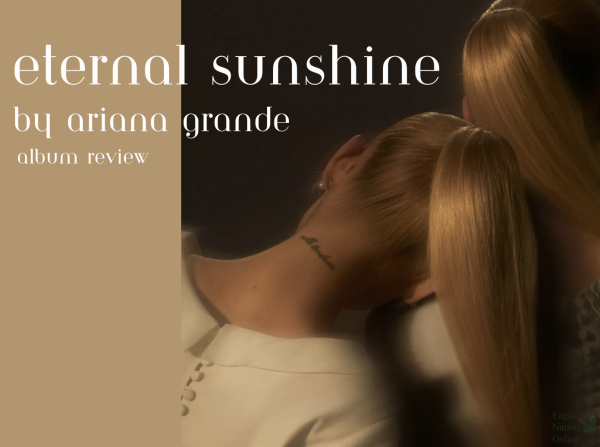Guest Column: My experience with autism
Marissa Hunter shares her journey
Standing with her family, junior Marissa Hunter holds flowers as she poses for a photo at her sister’s wedding. Hunter has shared her journey with autism, both with getting diagnosed and her journey after diagnosis. “Through everything I’ve been through,” Hunter said, “family has always been the most important part of my journey.”
April 27, 2023
Editor’s note: Junior Marissa Hunter wrote this guest column for Eagle Nation Online April 27, 2023. Contact a staff member if you have a guest column or article idea to pitch. We recognize and appreciate student and staff input.
Before my diagnosis
From as early as I can remember, I was always described as different, an “oddball,” weird and many other names. I first learned about autism in 3rd grade, when my older sister, Emily Reed, started an internship at a 6th grade special education classroom.
After learning about autism and realizing that what she was talking about perfectly described me, I immediately started doing research on autism and came to the conclusion that I should get tested for it. I brought this up to my dad, who informed me that I could not be autistic because I “make eye-contact and I had all A’s in school.” Even though I knew I was autistic, my dad and mom were sure I was not due to the fact that I did not act like “a typical autistic person.” The truth is that autism is a spectrum, and it is not linear. However, since I was not displaying the “typical” signs of autism, it was not even considered that I might be autistic until I was 16.
By the time I reached middle school I had been masking for most of my life. I didn’t know where the mask ended and where the real me began. Since I was not identified as being autistic, I didn’t even know that that was what I was doing. I didn’t find this out until looking back after I had gotten my diagnosis.
Missed opportunities
By 6th grade I was burnt out and struggling in school. I started to fail some of my classes and my school counselor suggested to my mom that I get evaluated for Attention Deficit Hyperactivity Disorder and anxiety. My mom decided to take her advice and we went to my pediatrician, Jeffrey Alvis, who has training and practices psychiatry. He had my mom, my dad, my teachers and myself, fill out a test to determine if I had ADHD. I was soon after diagnosed with ADHD Combined Type, Generalized Anxiety Disorder, and social anxiety disorder.
I started therapy and medications to help manage my ADHD and anxiety. While this helped explain something, it still didn’t explain everything. Since I had been misdiagnosed with social anxiety I wasn’t getting the proper therapy and help. It just didn’t make sense to me, since I believed the therapy and medications were supposed to make me “normal.”
I continued to feel isolated from my peers and eventually became depressed. I was put on antidepressants and they worked, until they didn’t. At the end of freshman year, the only good friend I had ever really had ended our friendship because we were too different. I eventually was able to make a couple of new friends, but I didn’t really fit in with them. I started masking more and more just to fit in, but I still didn’t. All of these things caused my depression to get worse. My pediatrician ended up recommending that I see someone who only practices psychiatry, because they might be able to better handle my medicines. We agreed and I started seeing Karah Brashier, and switched my counselor to Shahna Argyle. This was the best decision we ever made. It took Karah approximately 35 minutes to identify what everyone else up to that point had missed: my autism.
Relief after diagnosis
I then went through the official process of getting the diagnosis. When the diagnosis came in it was such a relief. It was a relief because what I always thought to be true, was validated. I was finally heard. Up to this point I felt that I must have been stupid, that I wasn’t trying hard enough, and that there must be something wrong with me. It wouldn’t take a genius to tell that I’m different. I don’t pick up on body language, I am awful with humor and sarcasm, I can’t pick up on the true intentions of people, I have really bad sensory issues, I am insistent on my routine being the same and it is difficult for me to make and keep friends. With my diagnosis of autism, I finally understood myself. It wasn’t just that I was stupid, that I wasn’t trying hard enough, or that there was something wrong with me, it was that my brain was hardwired differently. No matter what I would do I wouldn’t be “normal.” Through the help of my counselor and reading “The Spectrum Girl’s Survival Guide: How to Grow Up Awesome and Autistic” by Siena Castellon, I was able to realize that there was no such thing as “normal” and that I should stop trying to strive for it.
All the thanks
I am so incredibly grateful for all of the people in my life who helped me along the way, including a special thanks to Lindy Wilcox, Paige Trujillo and Candace Purdom. To Mrs. Wilcox, thank you for always being there and fighting for me every step of the way. To Mrs. Trujillo, thank you for helping me get all the way through high school and for fighting for me every step of the way. To Mrs. Purdom, thank you for always having your door open and for helping me through the many panic attacks I’ve had this year. Finally, thank you to all the teachers who have changed my life for the better.
A message to non-autistic individuals
Though April is National Autism Acceptance Month, you should always strive to accept everyone every month of the year. When you see someone being “weird,” instead of bullying or harassing them, be kind. Everyone’s ultimate goal in life should be to be kind. Instead of making others feel different and unaccepted, make them feel welcomed and loved.
A message to fellow people with autism
If you are uncomfortable with doing something, don’t force yourself to do it. I find it uncomfortable to be hugged unless I initiate it or it is family, but I was taught that rejecting a hug is rude. I spent all my life forcing myself to be okay with being touched and to look people in the eyes. You do not have to change who you are to make others comfortable. If someone is uncomfortable with you being yourself, then they don’t deserve to be your friend. It’s time to stop masking, and to stop changing ourselves to make the world more comfortable around us. It’s time for us to work together to make the world a place where we can feel safe and comfortable to be ourselves.


